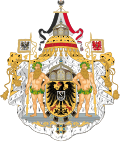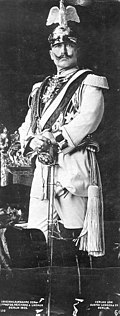German Emperor
| Emperor of the German Empire |
|
|---|---|
|
Imperial
|
|

|
|

Wilhelm II
|
|
| Details | |
| Style | His Imperial and Royal Majesty |
| First monarch | Wilhelm I |
| Last monarch | Wilhelm II |
| Formation | 18 January 1871 |
| Abolition | 28 November 1918 |
| Residence | Stadtschloss, Berlin |
| Appointer | Hereditary |
| Pretender(s) | Georg Friedrich |
The German Emperor (German: Deutscher Kaiser) was the official title of the head of state and hereditary ruler of the German Empire. A specifically chosen term, it was used between the 18 January 1871 proclamation of King of Prussia and President of the North German Confederation Wilhelm I as "Deutscher Kaiser" and the official abdication of Wilhelm II on 28 November 1918. The Holy Roman Emperor is sometimes also called "German Emperor" when the historical context is clear, as derived from the Holy Roman Empire's official post-1512 title of "Holy Roman Empire of the German Nation."
Following the revolution of 1918, the German head of state function was succeeded by the Reichspräsident (President of the Reich), beginning with Friedrich Ebert.
The title "German Emperor" was carefully chosen by Minister President of Prussia and Chancellor of the North German Confederation Otto von Bismarck after discussion which continued until the proclamation of Wilhelm I at the Palace of Versailles during the Franco-Prussian War. William I accepted this title grudgingly as he would have preferred "Emperor of Germany"; this had been unacceptable to the federated monarchs, and also would have signaled a claim to lands outside his reign (Austria, Switzerland, Luxembourg etc.).Emperor of the Germans, as had proposed at the Frankfurt Parliament in 1849, was ruled out by William as he considered himself a king who ruled by divine right and chosen "By the Grace of God", not by the people in a popular monarchy.
...
Wikipedia
